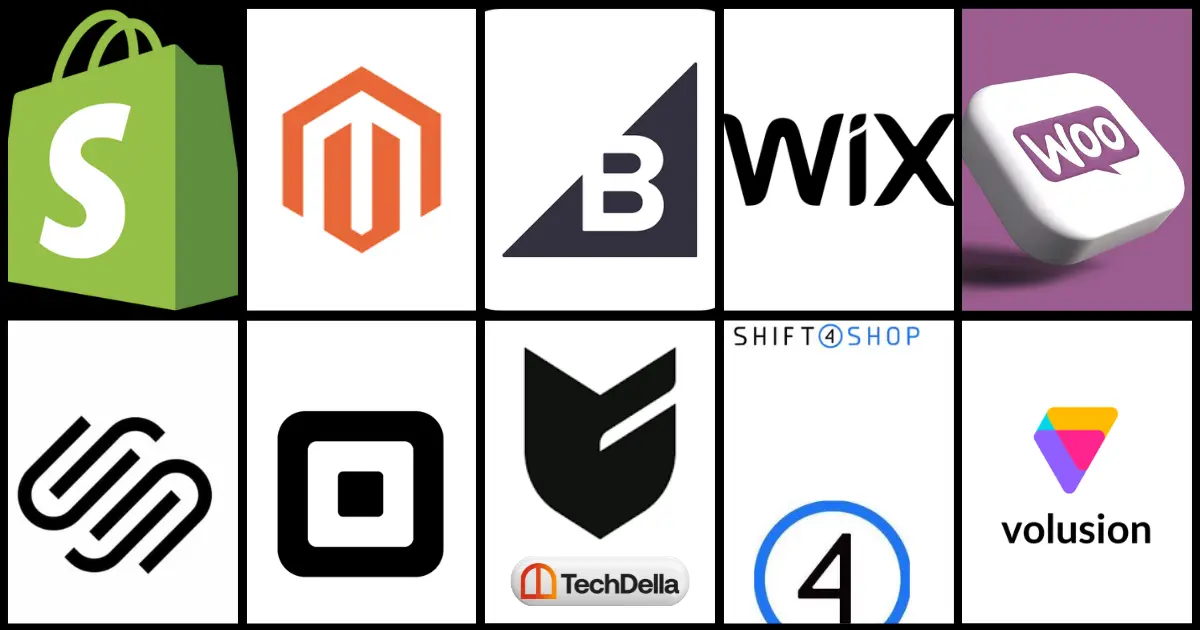Did you know that in 2022, consumers spent about 3.25 trillion dollars buying products on eCommerce marketplace platforms? This is significantly more than when consumers buy directly from an eCommerce website.
If you are wondering, “Do I need an eCommerce marketplace platform?”, then the statistic above should answer your question. When we discuss eCommerce marketplace solutions, consumers prefer shopping online because of the convenience these platforms offer.
So, what is an eCommerce marketplace platform? In this article, we will answer this question and review the best ecommerce platforms for startups and established businesses in 2026.
What is an eCommerce Marketplace Platform?
An eCommerce marketplace, or online marketplace, is a shopping platform that offers consumers different products or services from various vendors. These eCommerce sales platforms let third-party vendors sell online to many types of shoppers. This includes consumers, entrepreneurs, service providers, and both small businesses and large enterprises.

Large companies like Amazon or Alibaba operate marketplaces and are responsible for the eCommerce operation and platform for vendors. An eCommerce marketplace platform is a website or app. It lets many people and business owners come together. They can create their own website or a WordPress website to sell products and services in one place.
Examples of the biggest ecommerce stores include Amazon, eBay, and Etsy.
Examples of top eCommerce platforms include Shopify, eBay, Etsy, and WooCommerce. Registering your online shop on an eCommerce marketplace platform helps you reach target audiences. This is true whether you are targeting B2C, C2C, C2B, or D2C customers.
Read more about How to Start an eCommerce Business Online
Top 10 eCommerce Marketplace Platforms
Here is a list of the 10 best eCommerce platforms. These platforms can help you increase online sales and grow your business.

1. Shopify
Shopify stands as one of the most versatile and user-friendly ecommerce platforms available. With dedicated multi-vendor apps like Webkul and Shipturtle, entrepreneurs can effortlessly transform their store into a thriving online marketplace.
As an eCommerce marketplace platform, Shopify allows sellers to start with just a few dollars and no technical knowledge. Shopify is a full eCommerce platform. It helps small businesses explore tech business ideas and grow their eCommerce ventures.
The expertise in Shopify and leadership in commerce comes from the experiences of millions of merchants on our platform.
Why Choose Shopify?
Shopify is the best ecommerce platform for small business owners who want to start with minimal technical knowledge. The platform provides:
- Intuitive store management and product listing tools
- Powerful AI-powered ecommerce features for personalization
- Seamless inventory management across multiple sales channels
- Integration with social media for expanded reach
- Support for dropshipping and various retail models
- Mobile commerce platform optimization out of the box
Shopify makes it easy to build an online marketplace while providing enterprise-level features as you scale.
2. Adobe Commerce
Adobe, known for its enterprise-level capabilities, offers a comprehensive ecommerce marketplace solution. While it’s more suitable for businesses with advanced technical requirements, its scalability and performance optimisation are unparalleled.
Why Choose Adobe?
Perfect for brands seeking extensive customisation options for their multi-vendor marketplace platform. Adobe Commerce provides:
- Unlimited customization capabilities
- Advanced vendor management system tools
- High-performance infrastructure for large catalogs
- B2B and B2C functionality
- Integration with Adobe’s marketing suite
However, it requires dedicated web hosting and in-house developers or agency support.
3. BigCommerce
Another eCommerce platform is BigCommerce. Many people know it for its all-in-one approach. It offers many built-in shopping cart features and hosting options.
Comprehensive e-commerce is an excellent choice for businesses seeking simplicity without compromising functionality. This is the platform where SEO tools and responsive design contribute to its appeal.
Why Choose BigCommerce?
BigCommerce is ideal for businesses that want an online store builder with enterprise-level capabilities:
- Built-in SEO tools and voice search optimization
- Responsive design for mobile commerce
- Multi-channel selling capabilities
- No transaction fees on any plan
- Headless ecommerce capabilities for custom frontends.
4. Wix
Wix is an easy drag-and-drop website builder. It offers domain name registration, web hosting, and editable templates.
This makes it great for beginners. You can make a basic website for free. However, you need a paid plan to use the e-commerce features.
Why Choose Wix?
Wix is the best ecommerce platform for small business owners who prioritize ease of use:
- No coding required with drag-and-drop interface
- Accept payments through multiple gateways
- Track orders and manage inventory effortlessly
- Affordable pricing for basic ecommerce functionality
- Quick setup for the online selling platform needs
5. WooCommerce
WooCommerce is a free, open-source plugin. It changes a WordPress website into a full ecommerce solution. However, it is not really an e-commerce platform.
It’s a free plug-in that works well with your WordPress site. It gives vendors an easy dashboard to manage their products. Its flexibility and customization options are noteworthy.
Why Choose WooCommerce?
If you’re familiar with WordPress, WooCommerce offers unmatched flexibility:
- Completely free core plugin
- Thousands of extensions for added functionality
- Full control over your vendor management system
- Extensive customization options
- Large community support
6. Squarespace
Squarespace is a website builder and ecommerce platform for creative professionals to sell their products and services. It offers a simple and elegant way for businesses to showcase their work and reach a wider audience.
The marketplace platform also provides an easy way for customers to find the products and services they need. The Squarespace Marketplace is a great resource for businesses of all sizes.
Why Choose Squarespace?
Squarespace combines aesthetics with functionality:
- Stunning, professionally designed templates
- Built-in customer service tools
- Secure checkout with multiple payment gateways (Stripe, PayPal, Apple Pay, Afterpay)
- Integrated blogging and portfolio features
- Mobile commerce responsive design
7. Square Online
Square Online is an eCommerce marketplace platform that helps businesses manage online sales and physical store transactions. It has built-in inventory management and a point-of-sale (POS) system. Businesses can also accept payments online.
A free plan is available, but the paid plans offer far more features to help your small business sell more effectively.
Why Choose Square Online?
Square Online excels at unified commerce:
- Syncs with Square’s point-of-sale system
- Built-in inventory management across channels
- Accept payments online and offline
- Free plan available with basic features
- Ideal for B2C ecommerce platform needs.
8. Big Cartel
Big Cartel is a specialised eCommerce solution for small business owners with limited products and technical know-how. It offers the basic features necessary for creating an eCommerce marketplace platform. At the same time, it enables startups to start their online shops even with zero programming knowledge.
Why Choose Big Cartel?
Big Cartel focuses on simplicity for creative entrepreneurs:
- Free plan for up to 5 products
- Simple, no-frills interface
- Perfect for testing ecommerce marketplace concepts
- Low learning curve
- Artist-focused features
9. Shift4Shop
Shift4Shop is an eCommerce platform that offers built-in inventory management tools and web hosting. It helps you create a great website for your business. You can easily start selling your products or services online.
The eCommerce marketplace platform provides a feature-rich website builder, product and order management, customer marketing tools, and more.
Why Choose Shif4Shop?
Shift4Shop provides solid functionality at an accessible price point:
- Comprehensive product and order management
- Customer marketing automation tools
- Mobile-optimized templates
- API for custom integrations
- Free plan available (with payment processor requirement)
10. Volusion
Lastly, on the list, we have Volusion. Volusion is an eCommerce platform with comprehensive product descriptions and marketing strategies. It offers tools to help users create and manage online stores.
These tools include customizable website templates and a product catalog system. It also provides secure payment gateways and order processing. Users can manage their inventory and use marketing tools like SEO optimization and social media integration.
Why Choose Volusion?
Volusion simplifies complex online marketplace operations:
- Intuitive inventory and product listing management
- Seamless customer order processing
- Integration with 30+ payment gateways
- Built-in SEO and marketing tools
- Responsive design templates
Read more about Types of Ecommerce Business
How to Pick an E-Commerce Platform: A Checklist of Features
Making a list of features is helpful when you’re ready to choose an ecommerce platform for your new business. You should think about your business goals and the tools that will help you reach them when choosing ecommerce software. The best platform for one seller might not be the best platform for you.
When you’re making your list, think about whether these popular features would help you:
Read more about How To Make an Ecommerce Business Plan, and also learn more about eCommerce Business Plan templates
- Check out payment gateways that are safe and efficient
- Options for selling online and off
- Help from AI
- Inventory management and shipping in a hosting setting
- Toolkits for marketing and getting more customers
- Features for security
- Features of business and financial management
Read more about eCommerce Business Ideas to Start Online.
Common Mistakes When Choosing an Ecommerce Platform
1. Choosing Based on Price Alone
The cheapest online store builder may cost more long-term through limited features, expensive add-ons, or migration costs.
2. Ignoring Scalability
Ensure your ecommerce marketplace platform can grow with your business to avoid costly platform migrations.
3. Overlooking Mobile Experience
A poor mobile commerce experience directly impacts sales and customer satisfaction.
4. Neglecting SEO Capabilities
Built-in SEO tools are essential for organic growth on any ecommerce sales platform.
5. Underestimating Technical Requirements
Be realistic about your team’s technical capabilities when selecting between hosted and self-hosted solutions.
FAQ About Ecommerce Marketplaces
What are the top ecommerce platforms?
- Shopify
- WooCommerce
- Wix
- Squarespace
Is Amazon an ecommerce platform?
Amazon isn’t just an ecommerce platform. Amazon is an online marketplace that people and businesses from all over the world use. With Amazon, there is no language barrier. When you sell on Amazon, you’re part of a marketplace.
Platforms like Shopify give you tools to create your own website and store. This lets you control your branding and manage your inventory. Did you know that Shopify users can actually list their products on Amazon? One of the many sales channels available to them is just this.
Which ecommerce platform is best for startups?
Shopify undeniably stands out as a top choice for startups in the e-commerce world. This product stands out as being super user-friendly, budget-friendly, and packed with handy AI tools.
You can find customizable templates, secure payment processing, and easy integrations with popular apps. Also, it features an easy-to-use interface and great customer support.
What are the 3 main types of online marketplaces?
Types of eCommerce marketplaces
- Business-to-business (B2B)
- Business-to-consumer (B2C)
- Consumer-to-consumer (C2C), sometimes called peer-to-peer (P2P)
Conclusion
When comparing eCommerce platforms, the goal isn’t just to find the best software, it’s about choosing a platform that fits your needs and makes online shopping seamless for your customers.
Beyond just a store builder, consider how well the platform integrates with your payment provider, point-of-sale (POS) system, and business financing options to create a smooth, all-in-one solution.
Ready to find the perfect eCommerce platform? Contact us at TechDella to get started today!
The Techdella team writes about startup marketing strategy, growth tactics, and what actually works when you're building a company with real constraints.
Get it in your inbox
One email a week. Real startup marketing insights — no filler.
Join 1,400+ founders. Unsubscribe anytime.
You're in!
Thanks for subscribing. Your first issue will arrive shortly.



